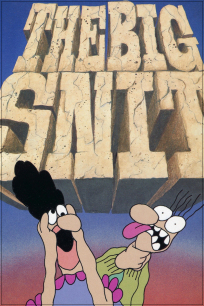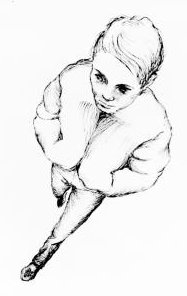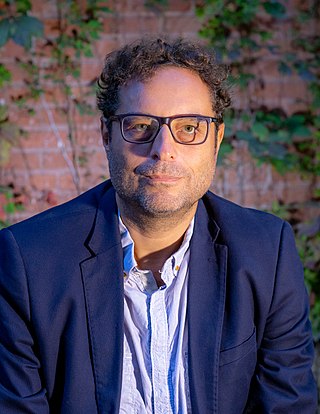
Ryan Larkin was a Canadian animator, artist, and sculptor who rose to fame with the psychedelic Oscar-nominated short Walking (1968) and the acclaimed Street Musique (1972). He was the subject of the Oscar-winning film Ryan.

The Big Snit is a 1985 animated short film written and directed by Richard Condie and produced by the National Film Board of Canada.
Every Child is an animated short film produced in 1979 by the National Film Board of Canada in association with UNICEF.
Richard Condie, is a Canadian animator, filmmaker, musician and voice actor. Condie is best known for his 1985 animated short The Big Snit at the National Film Board of Canada and has won six international awards for Getting Started in 1979. Condie lives and works in Winnipeg, Manitoba.
Colin Archibald Low was a Canadian animation and documentary filmmaker with the National Film Board of Canada (NFB). He was known as a pioneer, one of Canada's most important filmmakers, and was regularly referred to as "the gentleman genius". His numerous honors include five BAFTA awards, eight Cannes Film Festival awards, and six Academy Award nominations.

The Old Man and the Sea is a 1999 paint-on-glass-animated short film directed by Russian animator Aleksandr Petrov, based on the 1952 novel of the same name by Ernest Hemingway. The film won many awards, including the Academy Award for Best Animated Short Film.
The Canadian Screen Award for Best Animated Short is awarded by the Academy of Canadian Cinema and Television to the best Canadian animated short film. Formerly part of the Genie Awards, since 2012 it has been presented as part of the Canadian Screen Awards.
City of Gold is a 1957 Canadian documentary film by Colin Low and Wolf Koenig, chronicling Dawson City during the Klondike Gold Rush. It made innovative use of archival photos and camera movements to animate still images, while also combining narration and music to bring drama to the whole. Its innovative use of still photography in this manner has been cited by Ken Burns as the source of inspiration for his so-called Ken Burns effect, a type of panning and zooming effect used in video production to animate still images.

Kōji Yamamura is a Japanese independent animator who, after leaving a career as a background artist at an animation studio, directs, writes, edits, animates, creates the model sheets and background art for and sometimes produces his own short films and has worked on many commissions such as music videos, television advertisements, title sequences and station idents, both on his own and under or with other directors. He is also a regular illustrator of children's literature and textbooks.

Walking is a 1968 Canadian animated short film directed and produced by Ryan Larkin for the National Film Board of Canada, composed of animated vignettes of how different people walk.

Village of Idiots is a short animated comedy based on the classic humorous Jewish folk tales about the Wise Men of Chełm, directed and animated by Eugene Fedorenko and Rose Newlove, written by John Lazarus, and produced by the National Film Board of Canada (NFB). Fedorenko is the Academy Award-winning animator of the 1979 NFB short Every Child. In 1999, it was one of four films in the 1st Annual Animation Show of Shows.

Theodore Asenov Ushev is a Bulgarian animator, film director and screenwriter based in Montreal. He is best known for his work at the National Film Board of Canada, including the 2016 animated short Blind Vaysha, which was nominated for an Academy Award. He is a Chevalier of the Ordre des Arts et des Lettres of France.
Sleeping Betty is a Canadian animated short film by Claude Cloutier that humorously reinterprets the classic fairy tale Sleeping Beauty. Awards for the film include Best Animated Short at the 29th Genie Awards, the Audience Award at the Etiuda&Anima International Film Festival, the Audience Award and Judges Award at the Melbourne International Animation Festival, Best Animation at the Jutra Award, as well as the Public Prize and the Best Canadian Animation Award at the Ottawa International Animation Festival.
The Hungry Squid is 2002 animated short film by John Weldon, about a young girl whose homework and personal life is being disrupted by creatures, including a giant ravenous squid. The film was animated using Weldon's personal style of do-it-yourself filmmaking, combining low-budget computer animation with puppets, photos and stop-motion animation in a technique he calls "digital recyclomation." The film's producer, Marcy Page, had coined the term "recyclomation" during production of Weldon's 1991 film, The Lump.
Juke-Bar is a 1989 stop motion musical animated short about cockroaches who party inside a jukebox. The film is directed by Martin Barry and produced in Montreal by the National Film Board of Canada. Juke-Bar received the Genie Award for Best Animated Short at the 11th Genie Awards, along with the Special Jury Award and Public's Award at the Zagreb World Festival of Animated Films, the Silver Hugo in the Animation category at the Chicago International Film Festival and the best short film awards at the Carrousel international du film de Rimouski and Montreal World Film Festival.

Lipsett Diaries is a 2010 short animated documentary film about the life and art of collage filmmaker Arthur Lipsett, animated and directed by Theodore Ushev and written by Chris Robinson. The 14-minute film was produced by the National Film Board of Canada in Montreal, where Lipsett had worked from 1958 to 1972, before committing suicide in 1986. The film is narrated by Xavier Dolan.

The Spine is a 2009 animated short film by Chris Landreth about a married dysfunctional couple, created in Landreth's "psycho realist" style, in which characters' mental states are reflected in their physical appearance. Voices for the couple were supplied by Gordon Pinsent and Alberta Watson.
Wendy Tilby and Amanda Forbis are a Canadian animation duo. On January 24, 2012, they received their second Oscar nomination, for the National Film Board of Canada (NFB) animated short film, Wild Life (2011). With their latest film, The Flying Sailor, they received several nominations and awards, including for the Best Canadian Film at the Ottawa International Animation Festival, and on January 24, 2023, they received a nomination for the 95th Academy Awards under the category Best Animated Short Film.
The Boy Who Saw the Iceberg is a 2000 animated short by Paul Driessen, which uses a split screen to portray the real life and imaginary life of a young boy. A film without words, the 8 minute and 49 second National Film Board of Canada short is a retelling of the 1912 sinking of the Titanic through the eyes and active imagination of a young boy.
Craig Welch was a Canadian animator. He was most noted for his short films No Problem, which was a Genie Award nominee for Best Animated Short Film at the 14th Genie Awards in 1993, and How Wings Are Attached to the Backs of Angels, which won a number of awards at film festivals in 1996.








